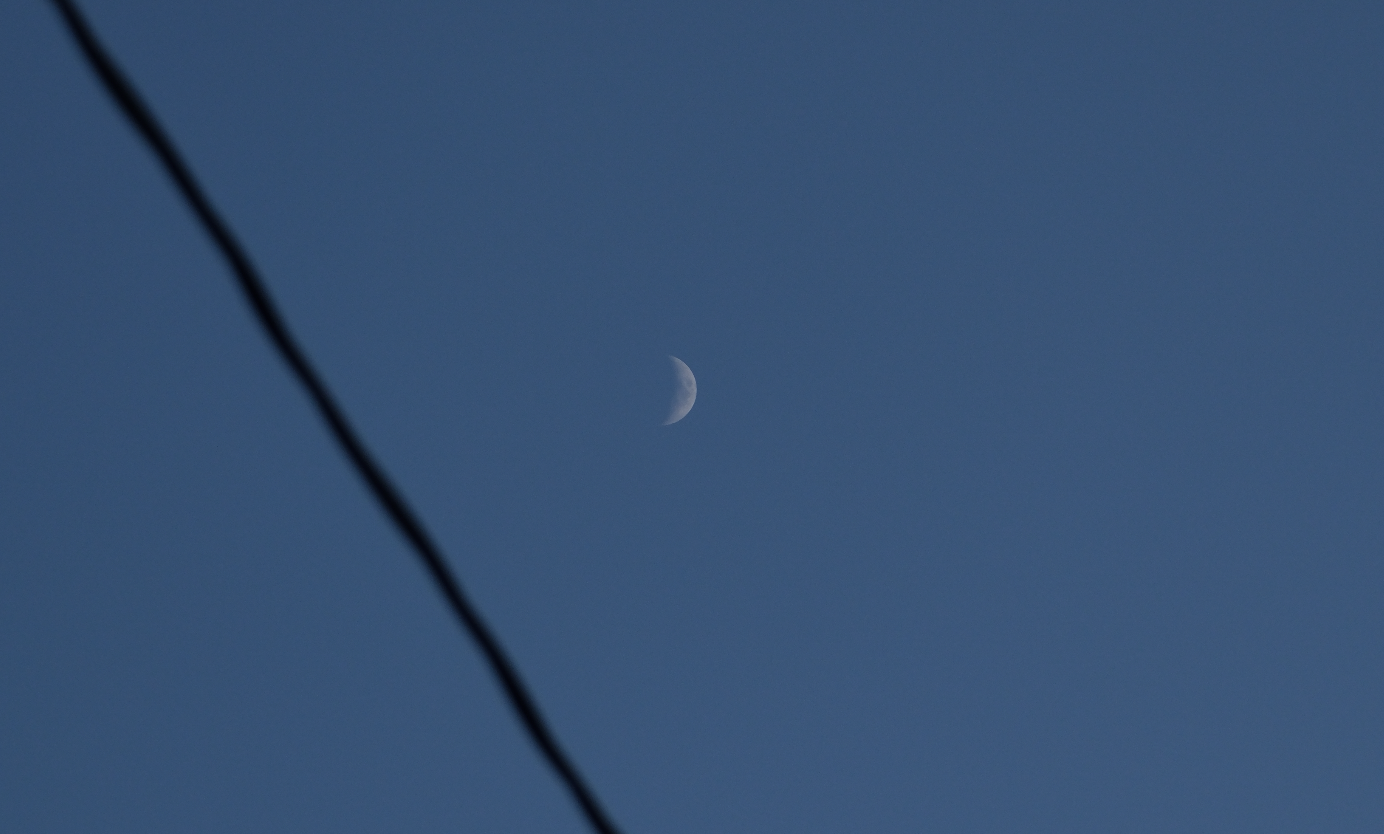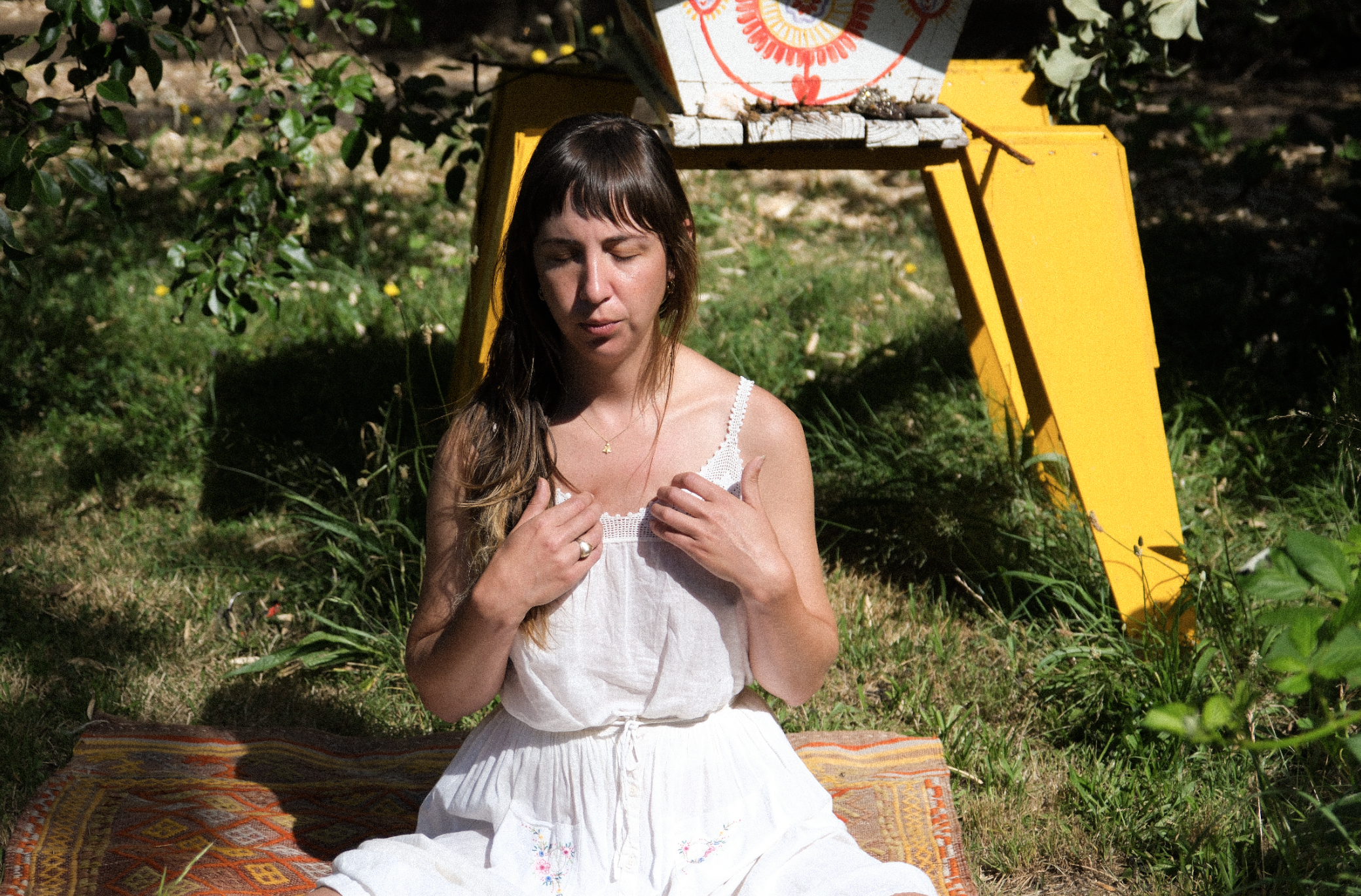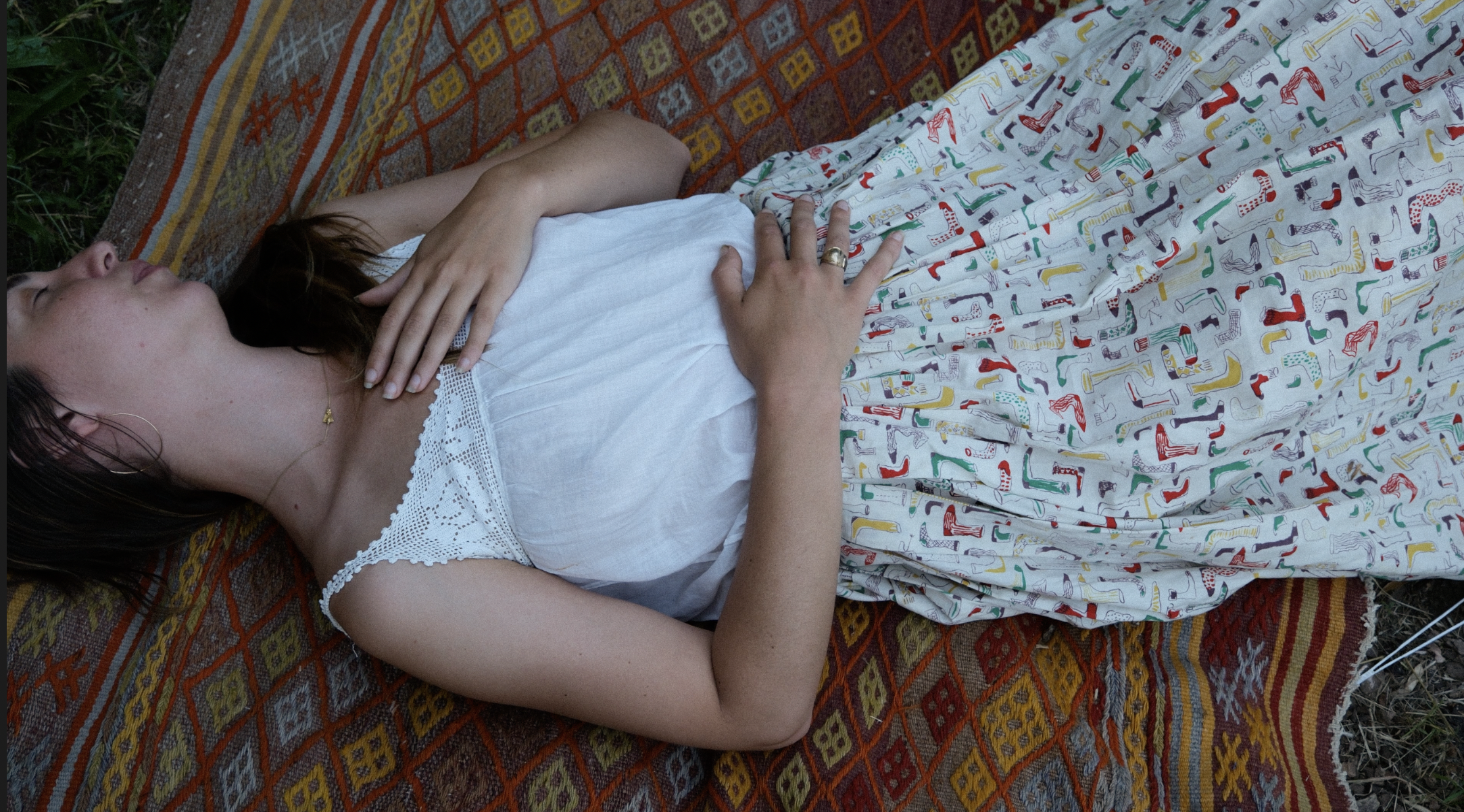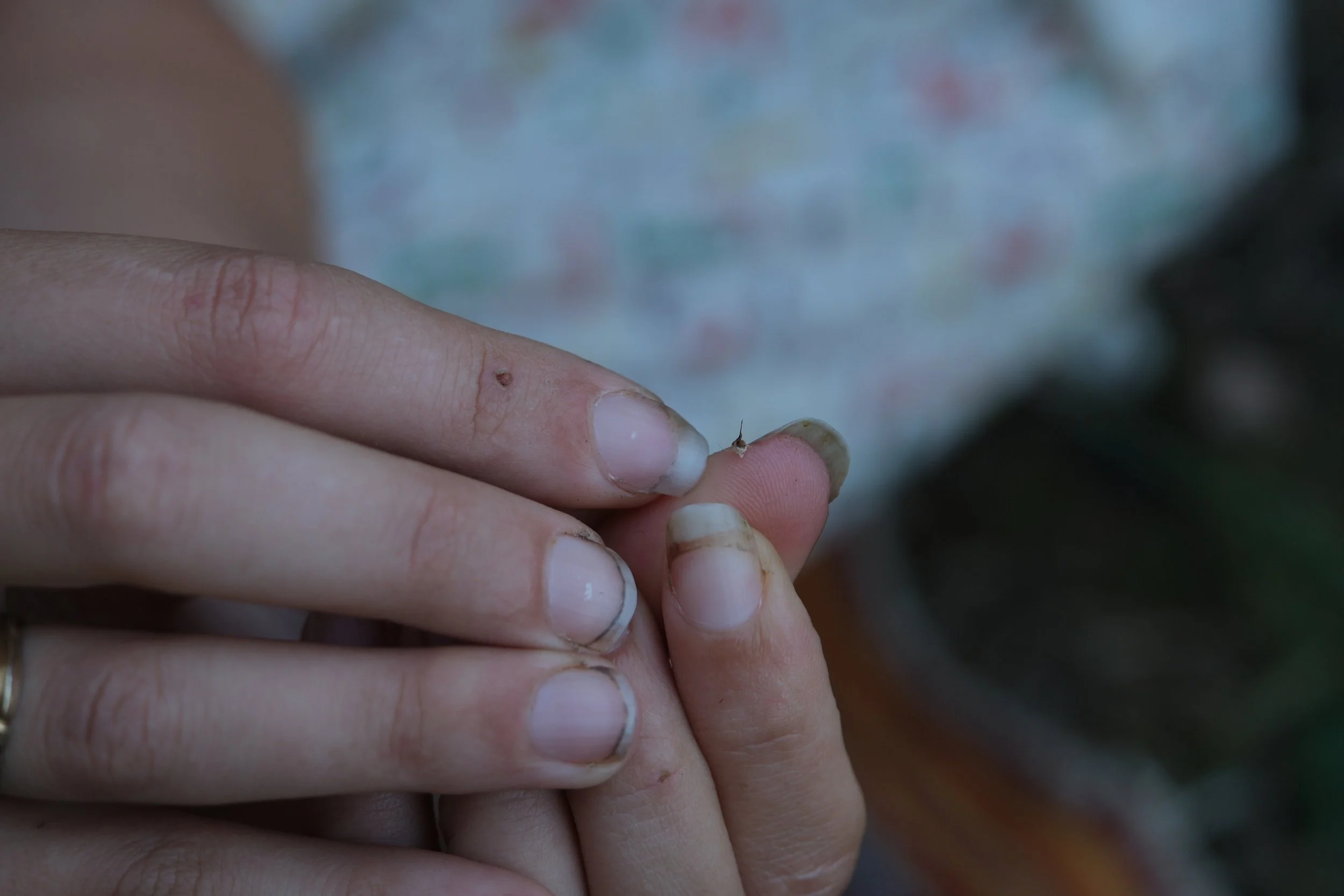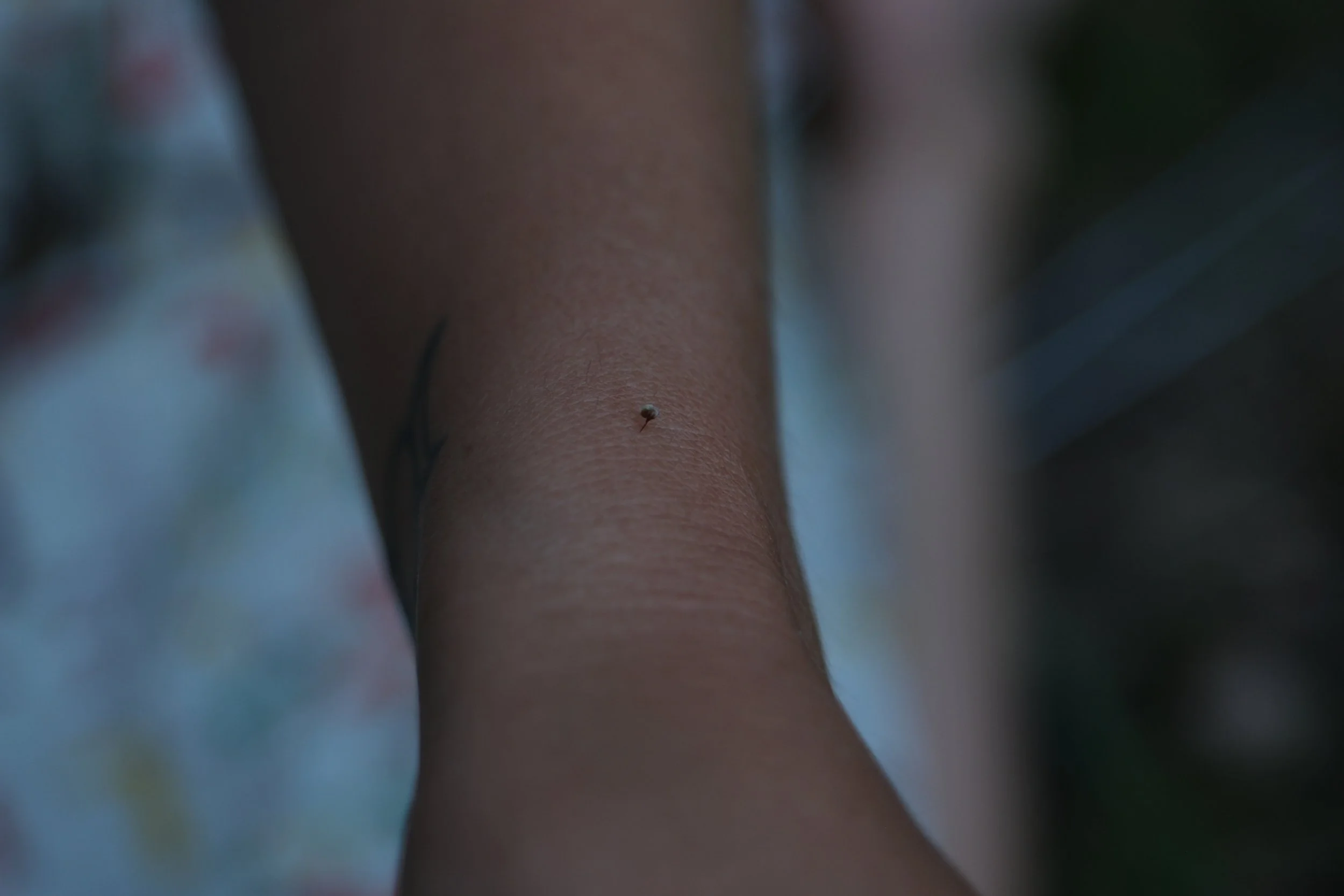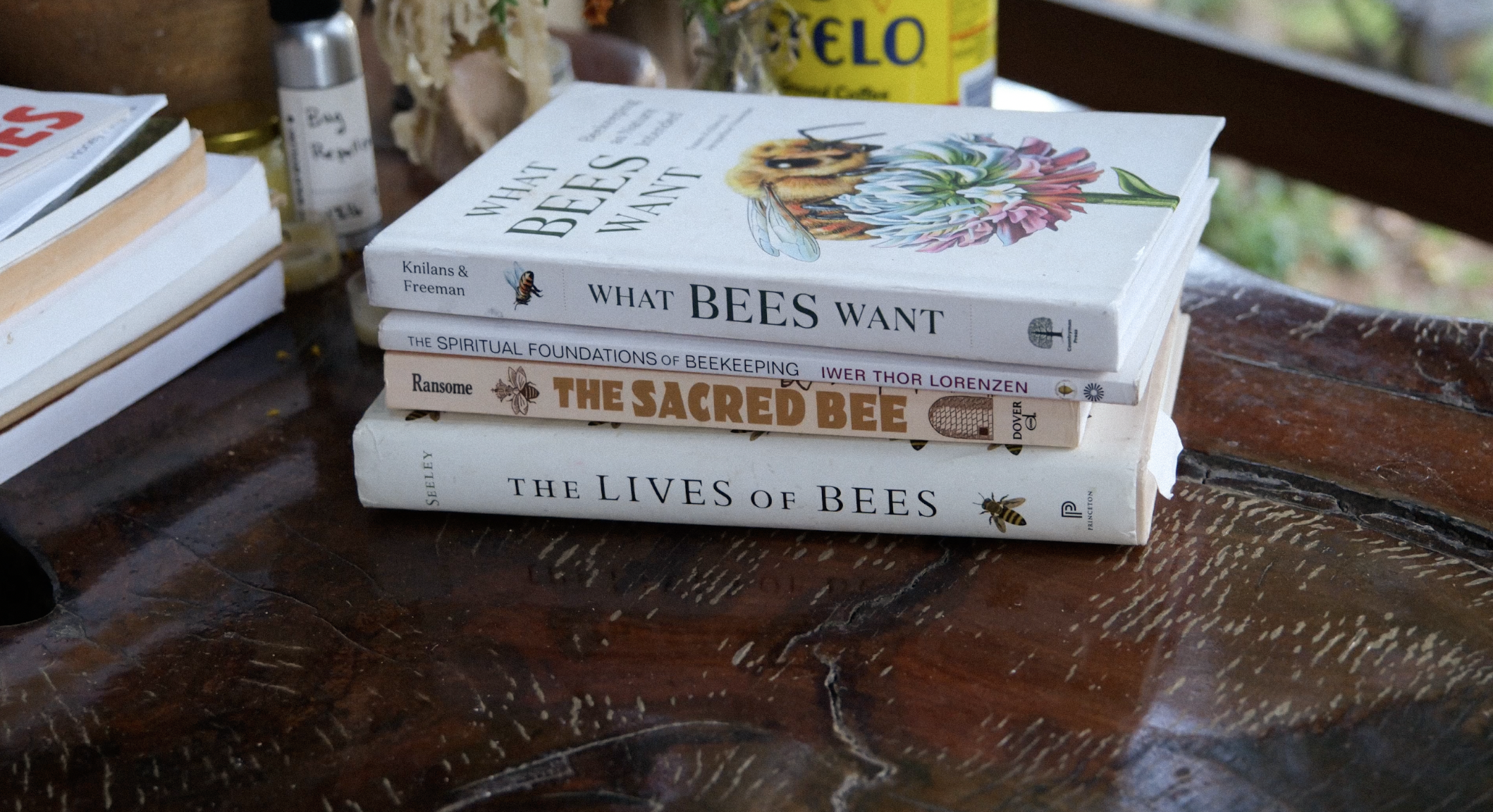Interview with Onyx Baird
INTERVIEW | ONYX BAIRD | Honeybee Conservationist & Filmmaker“When we're all functioning from our heart and purpose, then we as humans are like a super organism on this planet, creating beauty, harmony, and abundance like the bees do.”
Interviewer: I met Onyx at her offering called Bee Church. She invited us into her backyard to share about the energetics of pollen and how to connect with its essence. We spent the evening observing bees in her garden, participating in a bee meditation and sound bath, learning about pollen's energetic properties, and enjoying homemade honey cake and herbal elixir she had lovingly prepared. The experience was truly magical, and I'm grateful to have met this amazing bee oracle. Intrigued by Onyx's enchanting presence, I asked if she would be open to an interview for the Analog Nature journal. I later spent two evenings learning from her and taking photographs. My time with Onyx expanded my view on the world and how I relate to bees and nature. The work she is doing and the stories she is helping share and create is so needed in the world right now, I feel so inspired and expanded by Onyx's way of being in the world and the creative integrity she embodies in reverence to nature. I hope you feel the same upon reading.
What's your name? What are your pronouns? Where are you based, and what do you do?
My name is Onyx. She/her. I'm based in Portland, Oregon, and I'm a regenerative beekeeper and a documentary filmmaker.
How would you describe yourself and your essence?
I would describe myself in my essence as sensitive.
What helps you get into your rhythm and flow?
For me, it definitely starts with my home and routines. I need to be in a beautiful space that's clear, clean, and organized. My routines are important, like waking up in the morning and lately, coming out to the garden, drinking a big glass of lemon water, and just letting the sun hit me. I need slowness to move through my day intuitively. I really only like to work for about three solid hours a day and then have a lot of rest, breaks, being outside, grounding and focusing on nourishment.
Can you share a little bit about a bee's cyclical nature?
There are several layers to the cyclical nature of bees. Looking at the maidens or workers' life cycle, so when they hatch, they first start as nurse bees, feeding the babies. Then they become builder bees, focusing on building comb. Next, they become guard bees at the entrance protecting the hive. At the very end of their life, they become forager bees, out pollinating and visiting flowers — that's the most dangerous job and happens in the last week or two of their life.
But when I think about cyclical nature, I think a lot about the ebb and flow of contraction and expansion that bees do throughout the seasons. Bees that are wild, and if they're healthy and wise and in tune with themselves, they know when to expand their brood nest in spring when there's a lot of food available. That's an expansion phase that eventually leads to swarming — the natural way that bees reproduce which is essentially a hive giving birth to itself. They can do this up to 4-5 times a year.
And we are actually right now, just after summer solstice, going into a contraction phase. It's almost like the waning of a moon — were waning all the way until winter, and they'll stay contracted until about February or March when things start to bloom and the queen will start laying eggs again that will hatch. It’s almost like this waxing and waning and there is probably micro waxing and waning throughout the season depending on what’s blooming and what their needs are.
And how long is a bee's life cycle?
Four to six weeks for the maidens. The drones, which are the male bees in the hive, can live for ninety days. They're only around for the spring and summertime, and then they get kicked out and die. The queen, a healthy queen can live anywhere from three to seven years. If you think about the maidens, they would almost be like the cells in your body always being replaced every month or so.
How do you think we as a human species can learn from bees and their natural rhythms?
There's so much we can learn from bees. I'm letting the bees lead my whole life because I think they've got it figured out. There's a common misconception about bees being "busy as a bee" — this industrious idea that they never stop working. But it's such a lie. In commercial beekeeping, humans force them into that, but in the wild, bees rest. And they delegate tasks.
I've learned that we're not meant to function individualistically — it's not sustainable. We're meant to live like bees do, in communities where we all have our gifts and skills to bring to the table.
When we're all functioning from our heart and purpose, then we as humans are like a super organism on this planet, creating beauty, harmony, and abundance like the bees do.
It's not sustainable to work all the time — it's important to ebb and flow, to rest and then come back. Bees accomplish as much as they do because there are so many of them. It takes one bee a lifetime to make just a twelfth of a teaspoon of honey, but somehow the hive gets filled to the brim because there are 60,000 bees all doing their tasks to the best of their ability. And the hive is so permeated with this energy of unconditional love and the bees are like one of the only creatures that don't cause any harm. They only create more abundance through doing what they do. And I think humankind has the potential to do the same if we can learn to live in reciprocity with our environment and do what we came here to do and learn how to work together as one.
How do you think we can better live in harmony with bees as a human species?
We need to learn how to listen. We need to get out of this mentality that bees are an agricultural animal meant to be managed, manipulated, and controlled. It's an egocentric view of the world to think humankind is here to have dominion over nature rather than be a part of nature.
We need to learn that bees and all of nature are teachers. Just because we have big brains and opposable thumbs doesn't mean we're better than or know more than a tree or a bee. Just because they don't speak English doesn't mean they're not intelligent or don't have the ability to communicate wisdom and knowledge.
Humans need to get out of our ego, drop into our hearts, and come into a place of curiosity and slowness. We need to intentionally engage with nature in a way where we're cultivating a relationship and open to receiving whatever information nature and bees want to share with us.
What's something you've learned from the bees by listening?
The bees have taught me about balance and how to restore harmony in our bodies. The main thread of that for me has been sound. The sound of the hive itself is innately soothing to our nervous systems and helps us recalibrate and recenter. It's used for treating PTSD and is really effective.
When I've asked the bees about sound, they've shown me that when they fly around you, their sound breaks up stuck patterns in our aura — the subconscious patterning and thoughts that surround us. Their particular frequency breaks up those stuck patterns and allows them to be reshaped into a more harmonious state.
They've given me interesting exercises involving humming into parts of the body that feel stuck, stagnant, or in pain.
They showed me that sound is a powerful way to move energy and restore harmony in the system. Each organ and part of our body has a specific tone that is its harmonic place, and the root of all disease is really the imbalance of energies in the body.
What inspired you to get into your field of work or service?
I don't know if it was inspiration, but rather a call. I feel like the bees called me. When the bees found me, I was in an interesting place in my life. A couple of years before, I had graduated with my master's in fisheries and wildlife where I was working in fish virology. I thought I wanted to be a zoo veterinarian, but pretty soon in the program, I knew I didn't want to do it.
Afterwards, I tried to dive right into the arts. I always wanted to do fashion photography and planned to move to the West Coast, build a portfolio, and try to go to LA. I had rejected the science part hardcore. But when I visited LA, I hated it, which put me in a position of having to rethink everything.
I realized maybe I didn't need to push away the science part of me — maybe there was a reason for it and a way to integrate it with my creative passions.
Through divine intervention, I started meeting women beekeepers and interviewing them about their spiritual relationship with bees. After about a year, I became a beekeeper myself when I met Jacqueline Freeman, who became my mentor. She's a bee clairvoyant who talks to bees. She started giving me beekeeping equipment, and at one point I was helping her run her bee club. I didn't ask for this - it just claimed me.
I'm in full surrender to the bees. Anyone who gets into bees will tell you that when bees touch your life or call you, you can't help but fall in love with them and become the annoying person at the party who only wants to talk about bees. What i’m doing now is actually the opposite of my initial career path. There's nothing wrong with fashion photography or design as artistic outputs, but when something calls to you so deeply, you have to listen. I'm still figuring it out. Sometimes I'm more in flow and sometimes less, depending on how much I'm trying to control things. It works better when I surrender to the process and just stay in the flow.
Originally I thought the interviews I was conducting with these women beekeepers was going to be for a book. Eventually I realized this wasn't going to be a book, but a film, though I had no idea what I was getting myself into. As a photographer with no video experience, I thought I could do it for $5,000 with my DSLR and a mic. I started by filming interviews just to record what people were saying, not planning to use the video at all, just as a way to annotate later. Then I started learning about video and thankfully met my partner Pete, who's a tech wizard. Our first date was him following me around with a camera, and he's never stopped filming.
Tell me about Amrita. What is it? What inspired you to create it?
Amrita is a documentary film. The word means "honey" but also refers to ambrosia or nectar, with connotations of sacred food. I chose this title because the film is about restoring our reverent relationship with bees that we once had in the ancient world. I believe this lack of reverence is the root cause of why bees are failing, and it's a microcosm of why our world is the way it is. We've collectively lost our relationship to nature.
I'm following three different groups of women who have deep spiritual connections to bees while also taking a scientific, regenerative approach to beekeeping. We've been filming in Portugal, Hawaii, and the Yucatan. Each location has a unique approach, and now we're connecting these women with each other through the film and watching their relationships blossom.
We're currently raising money for the next leg of filming. We're about 60% done with production after three years, which has been a huge undertaking. It requires patience to create such a long-form piece, especially when filming seasonally across different locations.
Photos to the left pulled from Amrita trailer & Nitsa Citrine
Tell me about the three locations and the women you're following.
In Portugal, we're following the Bee Wisdom Network. They're incredible—I've never seen people living in such deep harmony with the earth. They live in off-grid communities, completely in sync with the natural world. When we filmed them, we only worked in the early mornings because they rest in the afternoons when it's too hot. Everything is dictated by environmental conditions.
They're focused on rewilding bees, returning them to trees where they belong, and they're creating innovative designs using cork, a local resource in Portugal. They're working to restore biodiversity to ecosystems devastated by industrial agriculture, and they're deeply exploring bee medicines, including bee venom therapy.
In Hawaii, I've been working with my friend Allison since 2018. She's amazing—rugged, badass, with cowboy energy, but also a deep spiritual connection to bees. She used to live in Oregon and was a biology teacher. While studying shamanism for anxiety, the bees came to her in a journey and told her to build them a sanctuary in Hawaii. She felt such a strong pull that she cashed in her retirement, moved to the Big Island, and walked around asking the bees where they wanted their sanctuary.
The bees guided her to start rescuing wild bees on the island and told her they needed round hives—things science is now confirming but that they were telling her twenty years ago. Shortly after she began rescuing these bees, an invasive pest was introduced that wiped out the wild bee population. The bees she'd rescued survived in her sanctuary.
In Mexico, we're working with Mayan women who care for a native species of tiny stingless bees that the Mayan people have had a sacred relationship with for over three thousand documented years. This shows the cross-cultural nature of spiritual connections to bees.
How did you choose these three regions?
The bees told me. Throughout this project, I've been going to them for guidance, asking what they want shown, who should be in it, and how to be in the right place at the right time. They were clear that they wanted women to be the carriers of this story. Not that men aren't important—men will appear in the film, but not as the main voices. This represents a reclamation of the feminine that has been suppressed for so long.
Other films about bees either don't include women or don't give them a predominant voice. Before filming, I spent about four years meeting different groups—I interviewed and filmed maybe 16 different communities. It became clear that these three were the ones to focus on because they all balance the spiritual and scientific approaches while actively doing the work. They would never get their stories out otherwise because they're too busy doing the actual work. They're also pure conduits, with authentic, unadulterated connections to the bees.
How can people support you in creating this film?
There are several ways. First, follow along by signing up for our email list at amritadocumentary.com or follow me on Instagram @ thebeeoracle .You can also share our current crowdfunding campaign—we're raising money for our next filming stage.
My flight to Crete leaves August 16th. We're going to the origin place of these ancient bee priestesses. My friend Sylvia, an amazing poet and scholar, is writing a poem that will serve as a mythic thread throughout the film. We'll pair it with Super 8 footage of sacred sites to breathe life into these ancient places and suggest what these women's lives might have been like.
Any contribution to our campaign is deeply appreciated. Our rewards start at just $10, and every bit helps. If you can't contribute financially, sharing about the project helps build our audience and momentum. For those interested in being private investors or making larger contributions, we have a fiscal sponsor nonprofit so we can receive tax-deductible donations.
How does nature inspire your creative process?
The creative process is definitely a co-creative process with the natural world. The bees are directing the movie - I'm just asking them and feeling if it's an internal yes or no, then going intuitively based on that.
This connection goes back to my childhood when nature was my friend and safe place. Growing up on five acres in Michigan with a swamp in the backyard, I spent hours catching bugs, watching birds, and exploring outside. That's where I felt love, acceptance, and safety. I've always had this kinship and intuitive connection to nature from a very young age, even though academics and music were what was encouraged.
What is one thing you wish everyone knew when it comes to bees?
I wish people knew that being a beekeeper doesn't inherently mean you're helping the bees. Our conventional beekeeping practices are actually one of the main reasons bees are suffering. That's the biggest misconception I wish people knew about. People come to beekeeping with good intentions, but then they look to the standards and regulations, which are all modeled off industrial agriculture.
What approaches would you recommend instead?
There are so many things, but I'd highlight three key elements: First, use bee-centric hive styles like a Warre Hive, which better mimics a tree. Second, add proper insulation to your hives year-round, not just in winter. Third, source your bees thoughtfully—getting wild feral genetics that know how to respond to diseases and predators. I call this the trifecta.
Also, create an ecosystem that actually supports them from the ground up. So many people just put hives in their yard and don't plant anything. A single hive needs about a million flowers, so planting a diverse garden is essential.
I also provide bee consultations if you have an interest in keeping bees but aren’t sure where to start.
What is your relationship with your own cyclical nature? How does it connect to your work with bees?
I really plan my work based on where I'm at in my cycle. I refuse to work on my bleed, especially days one and two. I give myself permission to rest and do nothing during those days. I book meetings and busier things during my follicular and ovulation phases. In my luteal phase, I'm tying things up and preparing to bleed.
I focus on nourishment through all phases, but especially when bleeding—drinking bone broth and nettles, eating red meat to replenish nutrients. I feel lucky to make my own schedule, and I find this cyclical approach actually allows me to accomplish more by the end of the month than trying to maintain the same productivity level every day.
How do you see the connection between human cycles and bee cycles?
There's a beautiful parallel. Just like we have inner seasons—follicular is spring, ovulation is summer, luteal is fall, and bleeding is winter—bees also have their rhythms. During winter, if bees have what they need in a home that supports them, they rest and rejuvenate. They don't have to work hard to stay warm, and they go through their stored nectar, taking in nourishment.
During my bleed, I pay attention to my dreams, do journaling and writing, receive inspiration, and process what's ready to be released. The veil feels thinner at that time in terms of connection to divine feminine wisdom.
Do you incorporate bee medicine in your cyclical practices?
Every morning when I wake up, I take a mixture of honey, propolis, and bee bread to prime my gut and boost immunity. I also practice intentional bee stinging for chronic pain, though I don't normally sting when I'm bleeding—that feels too intense.
I intuitively know where the sting needs to go on my body. I'd like to learn more about specific acupuncture points, but I follow my intuition about placement.
What are the benefits of bee venom?
It's really good at moving stuck energy. If you use bee venom over time, it actually has an overall anti-inflammatory effect on your system. Bee venom has also been proven to lengthen your telomeres, which are linked to aging. As you get older, your telomeres shorten, so bee venom actually lengthens them.
There's a whole thing about beekeepers living longer. It's common knowledge that beekeepers tend to live longer. They're getting stung regularly, eating bee medicine, and they're in that frequency.
What are some book recommendations and inspirations?
This is also great for people who want to get into beekeeping. The first one is called "The Song of Increase" by Jacqueline Freeman. That's more about the spiritual connection to bees and is a beautiful read for anyone who loves bees.
For a more practical beekeeping guide, Jacqueline and my other teacher, Susan Nylans, wrote a book called "What Bees Want" — very straightforward, step-by-step. Those are my two foundational bee books.
If you're interested in the cultural history of bees, there's a book called "The Sacred Bee" by Hilda Ransom, which is a really awesome resource. She covers every culture in the world and the different ways bees are interwoven.
In terms of documentary filmmakers, there are a couple I love. The first is Les Blank. He's amazing, and I'm so inspired by all his work. He has many anthropological documentaries, and he's been a huge inspiration for my filming style. Also Werner Herzog. I relate to him — he's quite insane. He's totally crazy, but he's also an amazing filmmaker in both narrative and documentary. He inspires me with his sheer determination.
Learn more about Onyx and her incredible work at her website
Photography+VIDEO by: BROOKE STEWART 



